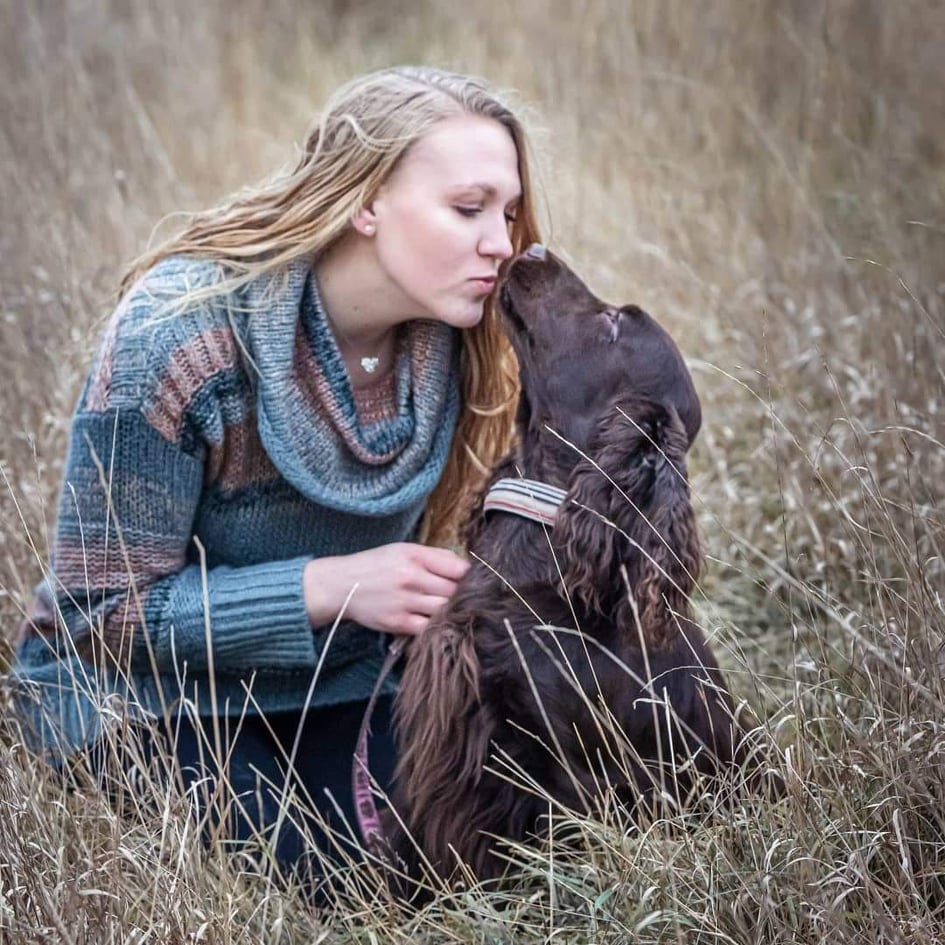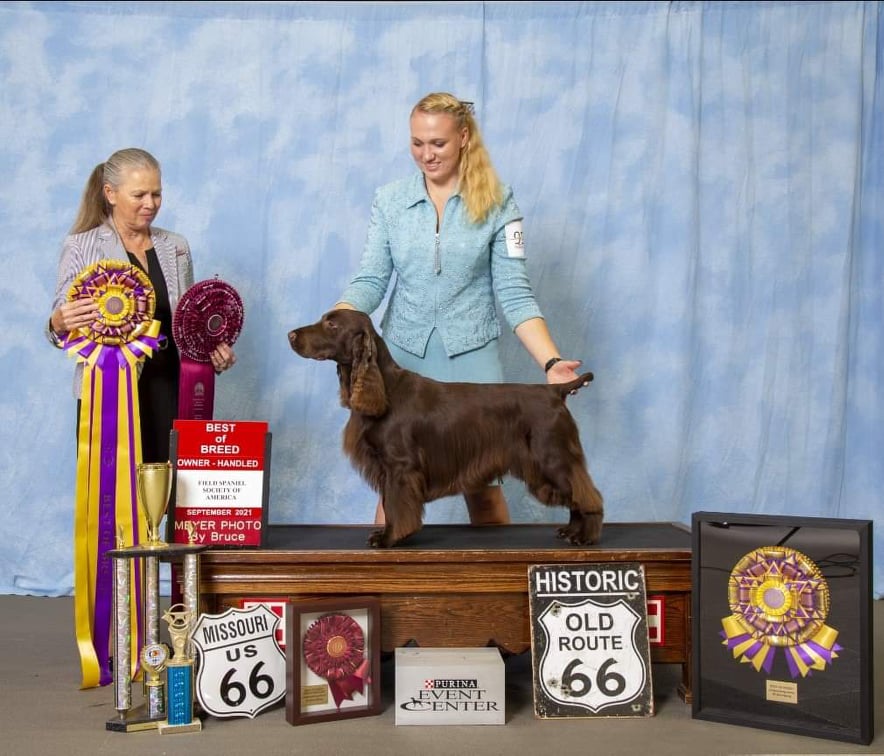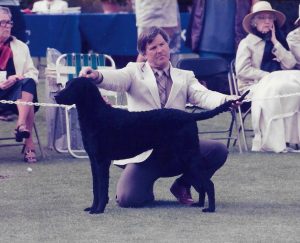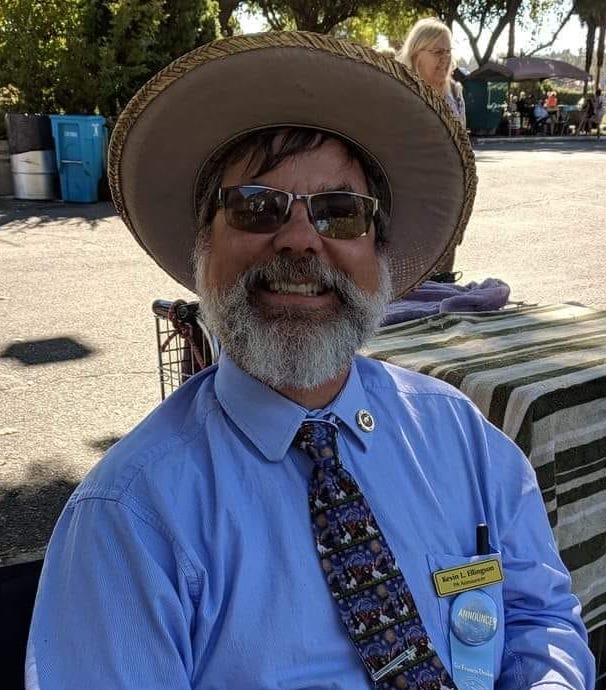“The Rest of the Story” — From Craigslist to Number One Field Spaniel
“The Rest of the Story” — From Craigslist to Number One Field Spaniel
 Mikala Seymour and her Field Spaniel, Riley, are an impressive team. Riley, GCHB CH Bruce’s Living the Life @ Upland, is currently the number one field spaniel all-systems and a national specialty winner, entirely owner-handled. This is a significant accomplishment for anyone. But “the rest of the story” is the impressive part.
Mikala Seymour and her Field Spaniel, Riley, are an impressive team. Riley, GCHB CH Bruce’s Living the Life @ Upland, is currently the number one field spaniel all-systems and a national specialty winner, entirely owner-handled. This is a significant accomplishment for anyone. But “the rest of the story” is the impressive part.
Mikala just turned 18 years old. And Riley came to her through Craigslist, as a three year old. A junior handler and a backyard dog teaming up to successfully take on the dog show world is not an everyday occurrence.
 “He was actually found for sale on Craigslist by my mentor,” Mikala said. “He was down in Texas. Three people piled together and were able to get him up here. My mentor when she finally got him had a table with her. She put him on the table, racked him up and said ‘underneath this mess of a dog’ ’cause his fur was matted and disgusting ‘there’s a really nice dog under here. I think it needs Mikala’s touch’ pretty much is what she said. She ended up cleaning him up a little bit and shipping to me. That’s when I started putting in the hard work. I had to teach him how to run, I had to teach myself how to groom. It was a good almost year of learning for me and we created a special bond and we’ve just gone from there.
“He was actually found for sale on Craigslist by my mentor,” Mikala said. “He was down in Texas. Three people piled together and were able to get him up here. My mentor when she finally got him had a table with her. She put him on the table, racked him up and said ‘underneath this mess of a dog’ ’cause his fur was matted and disgusting ‘there’s a really nice dog under here. I think it needs Mikala’s touch’ pretty much is what she said. She ended up cleaning him up a little bit and shipping to me. That’s when I started putting in the hard work. I had to teach him how to run, I had to teach myself how to groom. It was a good almost year of learning for me and we created a special bond and we’ve just gone from there.
“He was pretty much someone’s pet that they barely did anything with. They barely socialized him or anything. But he is the sweetest little thing. He just wants attention and he’s done so much for me. He’s learned to tolerate a lot too, with the grooming and stuff. He wasn’t too happy about it at first, but once he figured it out, he’s getting to be good with it now.
“I’m actually third generation with this. We started in Saints. I started showing Saints as well in juniors and in the bred ring. (That’s) the breed that I fell in love with. It made me want to continue doing this. And then somebody said I should try a sporting dogs to be a little more flashy over the big drooly Saint, so we tried that and it just kind of snowballed from there.”
Mikala offered her top three tips for anyone who wants to be successful with their dog in the ring:
- Find what makes your dog click. Get inside their head. “Learn what makes your dog special and get that connection with them so that they want to please you.”
- Always talk to people. Learn more about your breed. Learn about other breeds. Get advice from other people with your breed. “Learn from them and take everything with a grain of salt ’cause everyone’s gonna have a different opinion. You have to do what’s right by your dog, while still listening to their advice and thinking about ‘is this gonna work for my dog or can I use this tip but do it in a different way, so it works better for my dog’ kind of a thing.”
- Just have fun with it and do your best. As long as you’re having fun, you can’t go wrong.
361 – Specialty vs All Breed Part 2: Identifying Solutions
Specialty vs All Breed Part 2: Identifying Solutions
Our experts are back to help us identify solutions to the dilemma of specialty versus all breed shows. Part one is available for listening here.
All breed shows offer a moderating influence on the extremes that can reign at specialty shows. They also enable judges and owners to see the quality of dogs presented at specialties.
“The ultimate learning tool for judges is to get your hands on good dogs.”
And, in a special opportunity, I had a listener contribute thoughts on this topic that I think are absolutely on point and applicable to this conversation. Welcome Tracy Dineley, Clandara Perm Reg, with her input.
“I just wanted to write to you after listening to your latest podcast as this topic has been on my mind for the last few years and I myself have spoken about it many times and have also written about it.
First let me give you my 411. I have been involved in purebred dogs since 1981 as a professional handler and breeder exhibitor. I have been breeding and showing Staffordshire Bull Terriers since 1984. I have bred more all-breed BIS dogs than any other breeder in Canada and more National Specialty winners in Canada than any other breeder. I have over 80 champions in Canada and the US.
It is my opinion that showing strictly or mostly at one or the other, specialties versus all breed shows is actually detrimental to any breed. It divides a breed, usually not for the better, in two directions. In some cases, it has divided breeds to the point that they almost end up looking like two different breeds.
All breed judges versus breed specialists have different priorities when judging. An all-round judge will judge the whole dog. They won’t focus on one thing. They take soundness and movement into the equation. They may even refresh themselves with the breed standard.
The breed specialist judge tends to focus on types or heads. They forgive movement flaws and sometimes forgive to the point that they will put up maybe a pretty or typey dog that is just plain unsound. They might even focus on things that are an issue in their own breeding program. It is not always the most balanced opinion.
In my breed, I have found that many breed specialists will interpret the breed standard to suit themselves. For instance, the breed standard calls for a level topline, but many breeders say that level doesn’t really mean level. I also find that many specialty winners cannot win at the all-breed shows at a high level. I think it’s usually because they are not sound enough. Just the same as some top-winning BIS winners who cannot win a Specialty. They are not typey enough.
In my opinion, we should all be striving to win under both judges. To have a dog that is correct and typey enough to win a specialty and sound structurally correct enough to win under all-rounders at all breed shows.
I think your speakers on the podcast were perfect for this topic. I think out of the three breeds, Staffy Bulls, Collies, and Bull Terriers, the Bull Terriers are the only breed that has it right. I believe you could take pretty much any specialty-winning Bull Terrier and do some serious winning at the all-breed shows even to BIS level.
I think the possibilities of creating extremes happen on both sides and therefore are detrimental to any breed. We need balance. We should always strive for the best to be somewhere in the middle of extremes but have the best of both worlds.
Thank you for your podcasts, I look forward to them every week!”
301 — Ring Stewards: The Unsung Heroes of the Dog Show
Ring Stewards: The Unsung Heroes of the Dog Show
Kevin Ellingson, member of the Professional Stewards Association of Northern California, started ring stewarding in 2006 as a way to learn more about the sport while his wife was showing Cavalier King Charles Spaniels .
Ellingson said a couple of the most important things he learned when he started stewarding were to “respect the judge’s time and that judges are people too.”
“Ring stewards are ambassadors to the dog show world,” Ellingson said. “For new exhibitors, stewards may well be their first contact with the sport.”
From the PSANC website:
“A good dog show steward makes the work of judging a dog show easier by relieving the judge of unnecessary details. By assembling classes promptly, one will be able to keep the judging on schedule and eliminate, to a large extent, delays between classes.
Main Professional Steward duties:
- Hand out armbands and mark absentees
- Confirm with the judge the procedures that s/he wish to see carried out
- Assemble classes promptly and check to see that those entering the ring are wearing the correct armband
- Keep an eye on the clock to make sure the judge is on time
- Keep an accurately marked catalog noting placements, absentees and disqualifications
- Prepare ribbon and trophy awards for each class
- Keep the ring neat and clean, watching to make sure everything is running smoothly
- Assist exhibitors (new, experienced, or professional) to make them comfortable and at ease; treat all exhibitors professionally and with courtesy and respect (be cautious to not be too familiar with exhibitors to ensure professionalism)
- Contact show photographer, superintendent, or AKC Representative as needed
- In general, it is your duty to make the experience efficient and pleasurable for everyone.”
Learn more about this critical role at the dog shows. Ellingson provides a rundown of all the jobs the steward handles and why exhibitors should always be nice to the ring steward.
292 — Jeff Heim: “Dog Shows Are Not Dying” and Other Punditry
Jeff Heim: “Dog Shows Are Not Dying” and Other Punditry

Professional handler Jeff Heim with a Curly Coated Retriever in 1985.
Professional handler, Jeff Heim, reflects on 50 years of learning, from cattle judging in FFA to observing handlers and judges at dog shows.
As someone who is always willing to help, talk to a stranger or answer a question, Heim observed there is a fine line in mentoring.
“You need to offer advice in a way people will hear it,” Heim said. He also encourages new exhibitors to watch other handlers to learn.
“Find the handlers who are above average,” Heim said. “Watch them. See what they are doing, take that move home and try it on your dog… not everything works for every dog. Learn what the handler is doing and why, with that particular dog – they’ve done the trial and error to get to that point.”
Heim repeats, for the umpteenth time in a row, the downfall of “drive through dog shows.”
“You cannot come to the dog show, show your dog and go home,” Heim said. “Spend some time. You spent your money. There’s a whole dog show here. Go watch breeds that are similar to yours. Then go watch breeds that aren’t similar. Watch the judges all day.”
“A judge can only judge what you present to them,” Heim noted. “The judges are not going to make up what they want to see, they are going to judge what you show them. The mediocre dog with a great handler is going to beat the great dog with an average handler most of the time. Because the great handler never lets the judge see the dog’s faults.”
Amongst his myth busting thoughts, Heim blows away the idea of “DNS Lists.”
“There is no judge I will not show a dog to. It’s a waste of time. You pay your money and take your chances. But know the type of dog the judge will like,” Heim added.
In his typical bluff fashion, Heim also opined that dog shows are not dying.
“The sport isn’t going to die,” Heim insisted. “This sport was going during wars. These days we have a lot of shows and entries are down because they’re all spread out. Dog shows are not put on for your entertainment. They are for earning championship points. The entertainment is on you. Put together a potluck with your friends. Sit down, talk, learn about each other. Dog people all have varied backgrounds. Put your phones DOWN! Interact with each other. If you aren’t having fun, maybe you need to change your group.”




